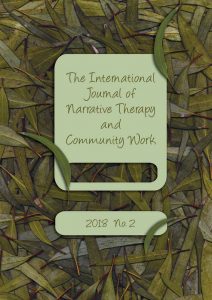 Dear Reader,
Dear Reader,
Welcome to this issue of the journal which has a special focus on the ways in which narrative practices can support parents and features paper from Australia and Canada.
Perinatal depression affects about one in every seven women who give birth in Australia each year. Amanda Worrall’s paper, Bringing our gaze to perinatal depression, vividly describes what becomes possible for women struggling with perinatal depression when they recognise their insider knowledge as legitimate.
Donna Stace’s paper, Walking the line between two practices: Accepting invitations to use narrative practices when facilitating Group Triple P, tells Donna’s story of facilitating a form of behavioural family intervention using innovative narrative practice initiatives throughout the eight-week program and how she ‘walked the line’ between the two practices. This process offered participants a culturally responsive and politically decolonising facilitation of Group Triple P while maintaining fidelity to the program. We believe this paper may be helpful to others working with parents and also any practitioner who is interested in introducing narrative practices into an existing program.
The third paper in this issue, Mothers take action: Fostering solidarity and reappropriating social and political space through a collective creative project is by Florence Godmaire-Duhaime, Anne-Marie Bellemare, Sebrena Caine and Alan Behary Laul-Sirder.This paper presents a case study and analysis of the use of creative arts and narrative tools in fostering solidarity and social change. It is co-authored by two social workers, a proud participant in the project, and a youth worker.
The final two papers in this issue focus on different themes.
With the opioid crises wreaking havoc in Canada at present, it seems a critical time to be sharing ways in which practitioners are seeking to respond. This is the focus of Jenny Johnston’s paper, Supporting folks to reclaim their lives from the control of substances: A Real People, Real Knowledge, Art Board. This paper, explores various narrative practices in responding to the control of substances over people’s lives: privileging marginalised voices, uncovering and elevating tacit or insider-knowledges, documenting and archiving these knowledges, specifically in the form of a collaged visual called, ‘Real people, real knowledge art board’.
The final paper included here by Julia Gerlitz is called Shame Fighters Anonymous: Co-created narrative documents in place of group therapy. This article describes an innovative use of narrative documents in which members of a project called Shame Fighters Anonymous wrote about being sexually abused/assaulted and how they were combating the resulting shame. Their writing was compiled into booklets and shared with other group members. This use of narrative documents enabled participants to join a shared conversation without having to meet in person and it took the place of a more traditional ‘group therapy’ approach.
We hope these writings assist you in your work. If so, the authors are all be keen to hear from you!
Warmly,
Cheryl White
Contents
‘Bringing our gaze to perinatal depression’, Amanda Worrall. (Pages 1-11)
‘Walking the line between two practices: Accepting invitations to use narrative practices when facilitating Group Triple P’, Donna Stace. (Pages 12-28)
‘Mothers take action: Fostering solidarity and reappropriating social and political space through a collective creative project’, Florence Godmaire-Duhaime, Anne-Marie Bellemare, Sebrena Caine and Alan Behary Laul-Sirder. (Pages 29-36)
‘Supporting folks to reclaim their lives from the control of substances: A Real People, Real Knowledge, Art Board’, Jenny Johnston. (Pages 37-51)
‘Shame Fighters Anonymous: Co-created narrative documents in place of group therapy’, Julia Gerlitz. (Pages 52-61)

 Dear Reader,
Dear Reader,